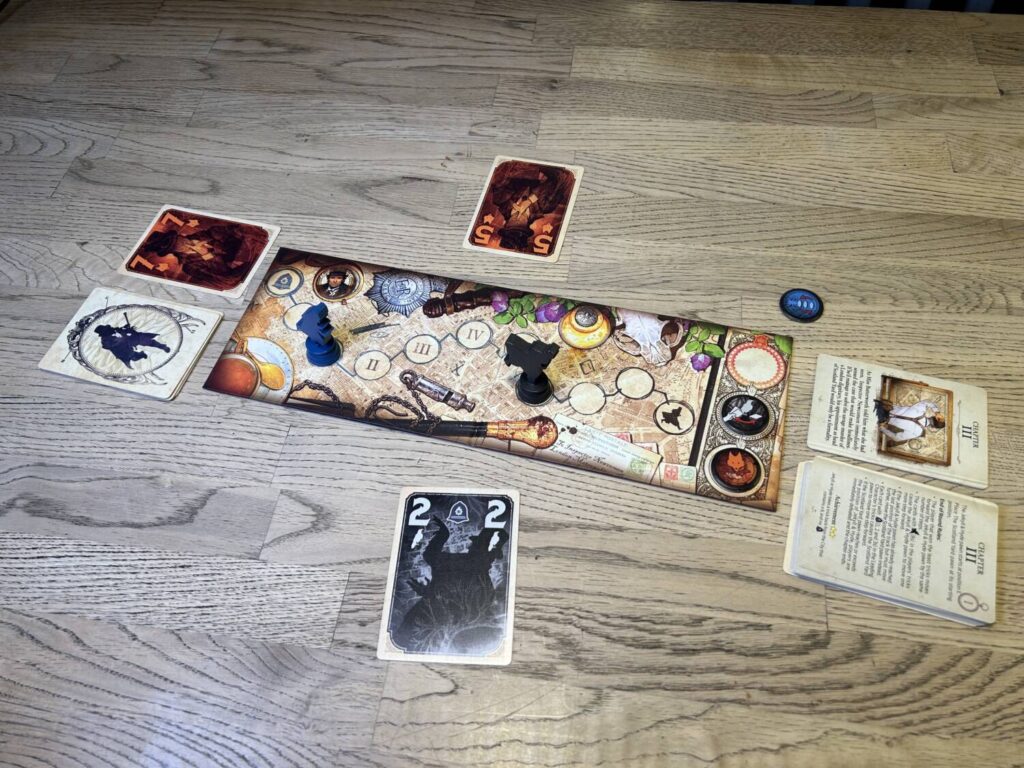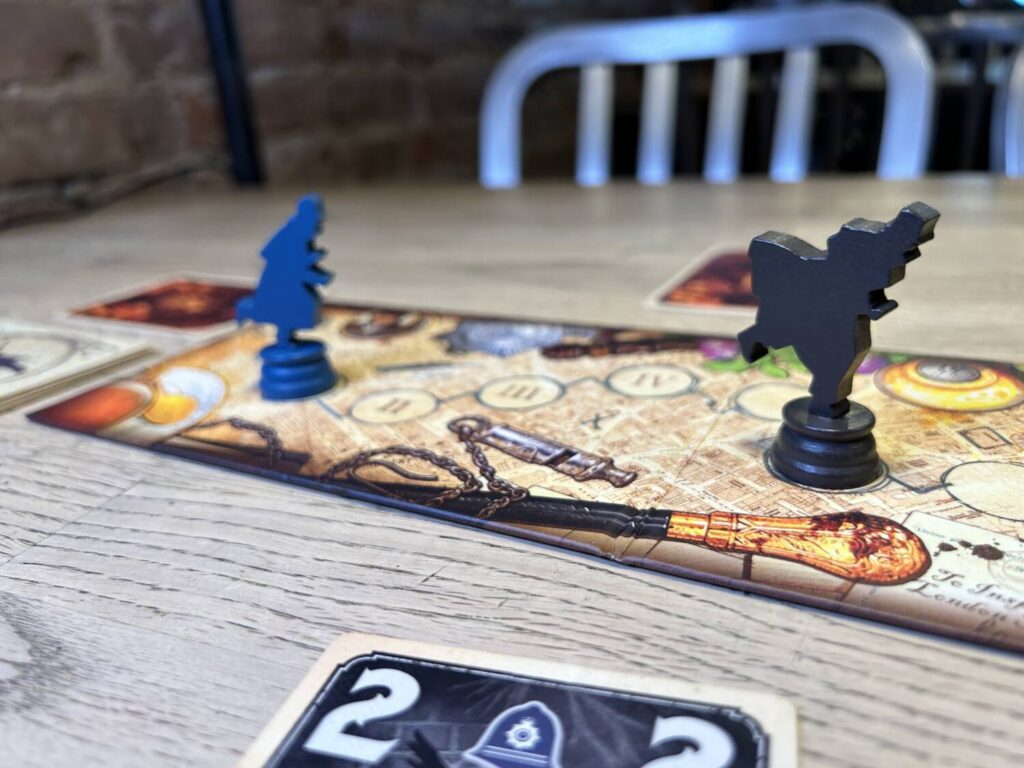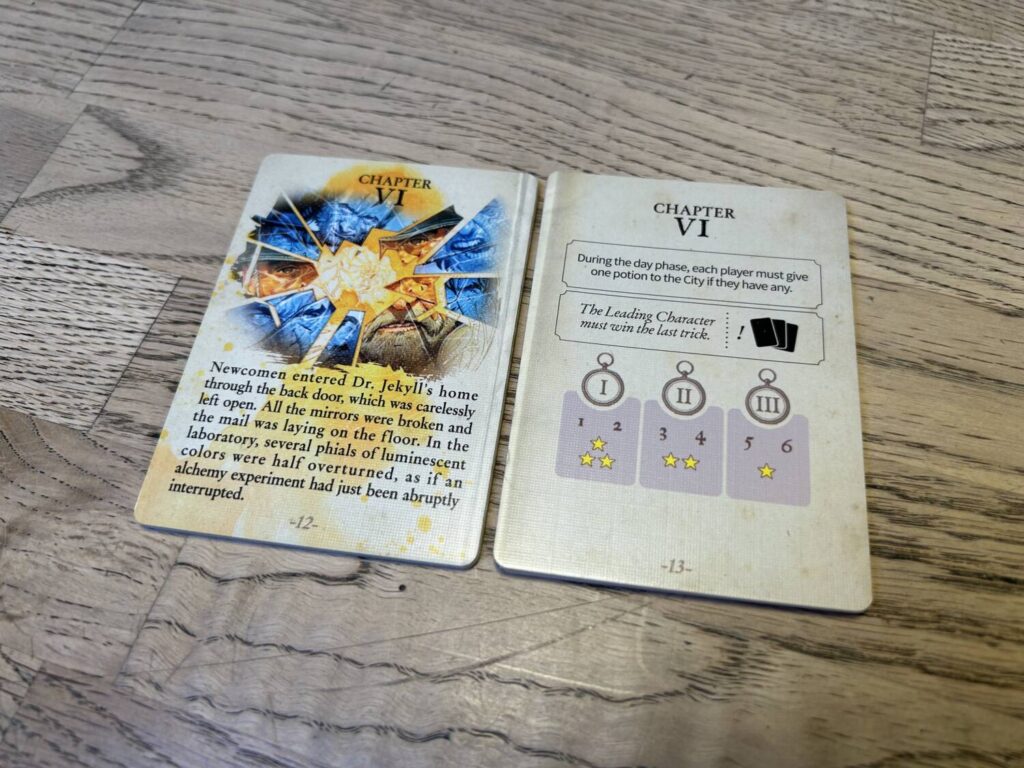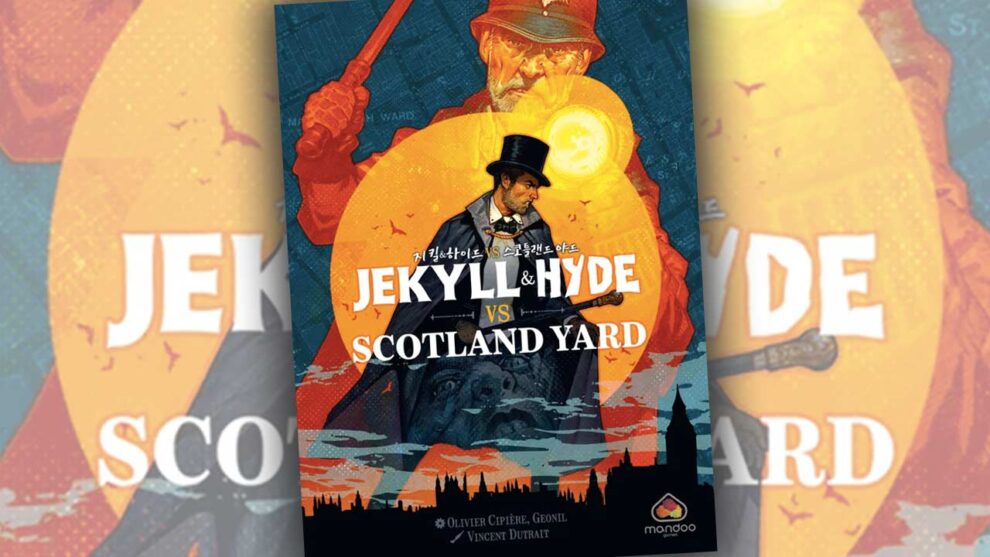We should come to an initial agreement on how things will be abbreviated in this review. Jekyll & Hyde vs. Scotland Yard is a long title, and I’m disinclined to have to type it out over and over again. You are likely disinclined to have to read it over and over again. It’s a perfectly reasonable title. It’s only an issue here because I will need to refer to it with some frequency.
On the face of it, Jekyll & Hyde is the cleanest solution, but that’s only on the surface. Jekyll & Hyde vs. Scotland Yard, a cooperative trick-taking game for two players, is a sequel to Jekyll vs. Hyde, a competitive trick-taking game for two players. I’ll need to reference that too, at least a few times. Jekyll vs. Hyde and Jekyll & Hyde. Given what I know about how humans read, leaving matters in the hands of that slight distinction feels like a big mistake. Contradictorily, the temptation to refer to them as vs. and & is very real.
We cannot allow bits to take precedence over functionality. It saddens me to say it, but I recognize the truth of that statement. From here on out, I will refer to the original game by its full title, Jekyll vs. Hyde, while Jekyll & Hyde vs. Scotland Yard will be known as Scotland Yard.

Five Things, Each Alike in Dignity
I’ve never read Strange Case of Dr. Jekyll & Mr. Hyde. The closest I’ve come is the Wishbone episode. I have no idea if the events depicted in the Chapter deck, which determines the rules for a given game, come from the plot of the novel or not. The events certainly feel right for a Victorian novel. After Hyde beats a man to death on the street, the split personalities of Jekyll and Hyde have to work together to flee the police, who are hot on his/their trail.
The attempt to flee plays out through a trick-taking game with a central board. This is a bit of a bear to explain, because the Jekyll vs. Hyde system, which Scotland Yard employs nearly unchanged, is unusual. There are five things you need to know, each interlocking, and together they give you a sense of what this game is like.
Turn order is straightforward. Scotland Yard leads off the first trick by flopping the top card from their deck onto the table. Play proceeds around the table. From there, the winner of each trick leads the next.
That’s the first thing.
There are three suits in the deck, and their relative strength is determined by the order in which they are played. If the first trick opens with a blue card, blue will be the weakest suit for the rest of the round. Any grey or red card will beat any blue card in a trick. If red is the next suit played, then grey reigns supreme. You’re building your own suit hierarchy each round.
That’s the second thing.
Then we have the suit powers. There’s a fourth set of cards in the deck, best thought of as wilds. These cards, Potions, react to the cards played around them, triggering special abilities. A red potion lets one of the two players take the most recent trick won by Scotland Yard. Grey allows one player to draw the top card from the Scotland Yard deck before placing any one card in their hand back on top. Blue rearranges the hierarchy of suits however the players choose.
That’s the third thing.
The goal is for the Jekyll/Hyde figure on the board to end up on the final space of the track without the Scotland Yard figure catching up. At the end of each of the two rounds, the player who has won fewer tricks moves the pawn a number of spaces equal to their trick count. Then, both players look through their won tricks and remove any 1s, 2s, 3s, and 8s. The 8s move Jekyll/Hyde forward one space each. The 1s, 2s, and 3s move Scotland Yard forward one space each.
That’s the fourth thing.
You’re not allowed to talk to each other once the cards have been dealt out. This can get incredibly tense, especially if you’re not on the same page about needing to win or lose tricks.
That’s the fifth thing.
Oh, there’s a sixth thing. Whoops.
Rather than a random and haphazard opponent, Scotland Yard is armed by the players themselves. Each player receives twelve cards and chooses four to discard. These discarded cards, eight in total, are shuffled together to create the Scotland Yard deck.
Take a moment. Read all that again if you have to. Go for a walk outside. Read a book. Strange Case of Dr. Jekyll & Mr. Hyde, maybe. It’s short.

Where Were We
This strange combination of systems makes for a fascinating stew. Even after ten or fifteen games, it feels unknowable. The other two-player game I’ve been spending a fair amount of time with over the last week, Sky Team, has started to feel more or less solved as a playing experience. I am having a great time with it, but my decisions stopped feeling interesting pretty quickly. Scotland Yard doesn’t have that problem. Every hand feels fresh.
Part of that is the inability to communicate with your partner, and relying on them to pick up what you’re laying down (sometimes literally). The rest of that comes from the system. I talked in my recent review of Potato Man about bum hands, an issue that doesn’t trouble either Jekyll vs. Hyde game in the least. It’s because of the Powers, and the suit hierarchy. Every hand is a great hand if you play it right. Some are more difficult to navigate than others, but they’re all great.
The other reason that the game stays fresh is the construction of the Scotland Yard deck. It is probably the most important, and most impenetrable, decision in the game. It presents a surprisingly flexible decision space. You can try to fill it up with a particular suit, for example. Since Scotland Yard starts both rounds, loading the deck with a given suit increases the chances that that suit will be low-rated. If you did particularly well in the first round and you want to take your foot off the gas, you might fill it up with the highest cards you’ve got.
Why would you want to take your foot off the gas, you ask? The Jekyll vs. Hyde system is about balance. In the original game, Dr. Jekyll wins by evenly splitting the number of tricks won by each player. Mr. Hyde wins by having either player win as many tricks as possible. In Scotland Yard, the need for balance shifts in a different direction. Any extra movement points Jekyll/Hyde picks up get transferred to the Scotland Yard pawn. The rules change as you progress through the chapter deck, and I have lost many of the harder chapters because of the excess movement rule. You are trying to thread a needle, rather than smash a target.

All Games, as We Meet Them, Are Commingled Out of Good and Evil
If I have one criticism, it is that the first Chapter is a poor introduction to the system. Chapters I-III are training rounds, drip-feeding you the full rules. Chapter I requires you to win exactly the right number of tricks to land on the final space, without overshooting. That lack of grace creates a fundamentally different space than the full game inhabits. It put me off the game, to be frank. I had to play Chapter II a couple of times to come back around to it.
Mandoo Games did a characteristically and exceptionally beautiful job with the production. Vincent Dutrait, never one to turn in bad art, has done exceptional work here. The manual is well-written and organized, which is more than I can say for a lot of games.
Unless you’ve played Jekyll vs. Hyde, you probably haven’t played anything quite like Jekyll & Hyde vs. Scotland Yard. I admire it tremendously, enjoy it fully, and I have a hard time imagining I’d ever be unhappy to play it. I’m not sure if I love it, but I very well might. Scotland Yard is simultaneously two things. The first is a 20-minute cooperative affair filled with tension and small but clever decisions. The second is a strange, gnarly, unknowable gremlin of a game. It’s almost like there are two games contained within one box.












Wow! As a guy married to a woman that loves cooperative games, this one might be a winner! We both love the Fox in the Forest Duet game; not sure if she will be in love with the theme of this one, but as someone who loved the original story, this one certainly resonated with me.
Great review, as always. Keep up the good work!
Both games in the series are well worth looking into if you’re interested. I played Jekyll vs. Hyde this morning for the first time in over a year, and it’s still a great game.